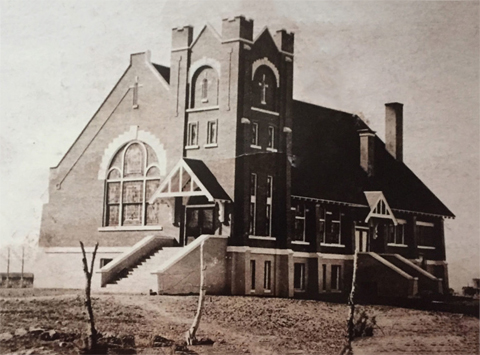The mother that was left behind.
My great-great-grandfather Titus Davis emigrated with part of his family to the United States in 1863. He was born in 1806 in Llandysul, Wales, and was raised by his grandfather.
Titus was the choirmaster at the church. He fell in love with Mary Bowen who was 21, Titus was 34. They were married in Llanwenog Church in 1840. Mary was born in 1819. She came from a distinguished family who owned a prosperous woolen mill in Maesyfelin.
Mary’s family disapproved of her marriage to Titus, as he did not meet their social standards. Seven of their 11 children grew to adults. In 1858, Titus and his son, David became members of the Mormon Church, and made preparations to migrate to the U.S.. But Mary was opposed to this new religion. She was a dedicated Baptist and refused to migrate. She sought the counsel of her minister and was advised against leaving her homeland and family. She felt Mormons made mockery of religion.
Titus decided to go and David, Timothy, Gwenny, Thomas, John and Henry were to go with him, while Jenkin was to remain with his mother. Thomas grieved his whole life over the abandonment of his mother. They never saw her again and she died at the age of 60 in the poorhouse.
David stayed in Wales another year to do missionary work for the Mormon Church and Titus and his children left in May of 1863 from London on the American ship, Amazon. They arrived in New York on July 18, 1863.
The journey across the sea was monotonous and Timothy contracted typhoid and it was a miracle he survived. It was at the height of the Civil War and progress was slow. They proceeded to Detroit in cattle cars and here a family from Dowlais gave their dead child up to strangers for burial.
They reached St. Joseph on the Missouri River and were put on a boat for Florence, Nebraska. They joined up with John Edward’s wagon train and were requested to sign a note of 10 dollars per person with 10 percent interest.
The wagons were loaded with merchandise to sell in Salt Lake City and so all immigrants had to walk. Walking gave them a tremendous appetite, but they were on half rations. Timothy suffered the most because of his illness. Sometimes they went hungry so that Timothy could have more to eat.
When they reached the Wood River they saw their first American Indians and were shocked at their naked appearance. The Indians were peaceful, though and they did not encounter hostile tribes.
There were a few scattered settlements, but further west they saw only military stations a long distance apart. When they reached higher altitudes the weather turned cooler and at night they slept under the wagon on the ground. Little Henry, who was only three, never complained of the hardship. Thomas felt he needed the love and care of his mother.
In Wyoming, they experienced bad storms of wind and snow. On the other side of the mountains the weather became warmer and soon they descended into Salt Lake Valley at Emigration Square and continued northward to a village called Willard where other Welsh families had settled before them.
Gwenny and John Edwards had fallen in love along the way and the following November they were married. John built Gwenny a beautiful stone house and they raised eight children. This house still stands and is on the Utah State historical list. She died in 1912 at the age of 87.
David, who came a year later to Utah, built boats and sailed on the Great Salt Lake. He kept a log of his journeys and chartered the shoreline in detail. One cove is named for him. He was also a merchant. A sketch has been written about him in the Utah State biographical encyclopedia. He died in 1926 being 85 years old.
Timothy was also a merchant in the village of Logan, Utah. He married and had 10 children. He died in 1916 at the age of 74. John was also a merchant in Logan. He worked with Timothy, and later had a store of his own. John loved music and taught people to play different instruments. He played the flute and had a beautiful bass voice. He sang in the Logan Tabernacle Choir.
He was the only member of the family who witnessed the driving of the Golden Spike in Promontory, Utah, in 1868. He had eight children and died in 1928 at the age of 76.
Henry lived with his sister Gwenny and later was employed by a merchandise centre as a salesman and travelled throughout Utah selling from his horse-drawn buggy. He had eight children and died in 1925 at the age of 66.
Jenkin, the child who was left behind with his mother, was very active in the Baptist Church at Penygroes, Wales. He traveled the countryside spreading the gospel of his church. He was also a successful merchant. It is not known when Jenkin died.
Thomas, who is my great grandfather, learned the blacksmith trade in Willard, and later went into cattle raising and farming. He was elected to Idaho State Legislature for two terms and was appointed mineral commissioner by President McKinley. More than any of the children he thirsted for knowledge throughout his life and was self-educated very well. He was active in politics and civic affairs. He conducted a brass band and performed at local functions. He had 11 children and died in Malad, Idaho in 1926. In 1898 Thomas left the Mormon Church and never returned. He became an active Mason. In 1923 he wrote his life story.
Their father Titus lived out the rest of his life in Willard, Utah. He died in 1898 at the age of 92.
